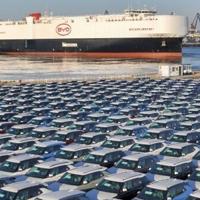The European Union has issued a threat to impose additional tariffs on Chinese electric car imports, ranging up to 38 percent from next month, as a result of an anti-subsidy investigation. This move has the potential to ignite a trade war between the two nations.
The decision by Brussels to launch the probe last year to protect European manufacturers has stirred discontent in China. Just hours before the official announcement, Beijing cautioned that such action would be detrimental to Europe’s own interests.
Internally, there is opposition within the EU, particularly from Germany, a key trade partner with China, who believes that the tariffs will negatively impact German companies.
The European Commission has now mandated provisional tariff increases on Chinese manufacturers, with rates of 17.4 percent for BYD, 20 percent for Geely, and 38.1 percent for SAIC. The commission has determined these rates based on the level of state subsidies received by each company.
All other Chinese electric car producers who cooperated with the investigation will face an average duty of 21 percent, while those who did not cooperate will be subject to a 38.1 percent duty, in addition to the existing 10 percent on all electric cars produced in China.
In order to avoid the imposition of these additional tariffs, China and the EU must work together to resolve the subsidy issue. The European Commission emphasized that failure to reach a resolution could result in the implementation of these provisional countervailing duties.
The tariffs will be enforced provisionally starting from July 4, with definitive implementation from November, unless a qualified majority of EU states opposes the move.
China had warned prior to the announcement that these tariffs would constitute protectionist measures, going against market economy principles and international trade rules. The foreign ministry spokesman stated that China will take all necessary measures to protect its legitimate rights and interests.
– China warning –
The probe was initiated by Brussels last year in response to what officials deemed unfair practices that were undercutting Europe’s car manufacturers. While the EU’s tariffs are high, they are lower than the United States’ 100 percent rate imposed on Chinese electric cars last month.
Not all EU member states are in agreement with the commission’s decision. Germany, Hungary, and Sweden have expressed reservations about the investigation and the proposed higher duties.
China is a crucial market for German car makers, with Hungary also looking to establish a BYD factory next year. Geely, which owns Volvo, has connections in both Germany and Sweden.
Chinese Chamber of Commerce to the EU (CCCEU) criticized the investigation, labeling it as politically motivated and protectionism driven. The organization argued that the probe lacked substantive complaints from the domestic industry.
– Retaliation –
Chinese media had previously hinted at potential retaliatory measures targeting EU exports such as pork and dairy products. Any action taken by China in this regard could have severe ramifications for European exports, especially in the agriculture sector.
EU exports of dairy products to China totaled around 1.7 billion euros last year, making it the third-largest destination for EU agri-food exports. China is also a significant car exporter globally, with Europe being a critical market for its products.
The Kiel Institute for the World Economy in Germany estimated that a 20 percent tariff could result in 125,000 fewer Chinese electric cars being exported to the EU, amounting to almost $4 billion in value.
burs-raz/rmb/lth





